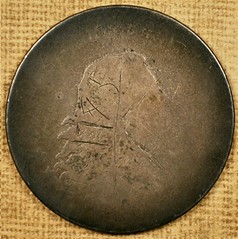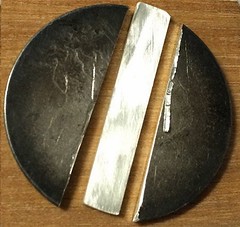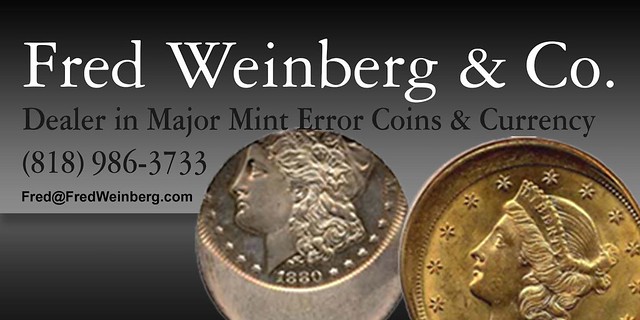
PREV ARTICLE
NEXT ARTICLE
FULL ISSUE
PREV FULL ISSUE
CHEMICAL ANALYSIS OF EARLY U. S. SILVER COINS, PART 2David Finkelstein and Christopher Pilliod have released a paper summarizing the second phase of a multi-phase project to determine the chemical composition of 1794 and 1795 US silver coins. -EditorDavid Finkelstein and Christopher Pilliod are releasing a multi-part article series about a project to determine the chemical composition of 1794 and 1795 US silver coins. The pair gave a presentation at the John Reich Collectors Society (JRCS) General Meeting during the ANA World’s Fair of Money in Philadelphia. The Mint and Coinage Act of April 2, 1792 specified that silver coins were to contain 1485 parts of pure silver and 179 parts copper alloy. This equated to a standard of 1485 / 1664 or 89.24278% or 89.24+% pure silver, and 10.75722% or 10.76-% copper alloy. Multiple documents stored within the National Archives and Records Administration (NARA) and the Library of Congress indicate that under the leadership of Mint Directors David Rittenhouse and Henry William de Saussure, some or all of the 1794, and most or all of the 1795 dated silver coins were produced to a 90% silver and 10% copper standard. Then, effective November 6, 1795, under the leadership of its third Director, Elias Boudinot, the Mint reverted to the 89.24+% silver and 10.76-% copper standard. The first phase of a multi-phase project was just completed to determine: 1. what elements and percentages are in the silver coins of 1794 and 1795,2. what elements and percentages are in the copper coins of 1794 and 1795, 3. whether the Mint attempted to refine any of the silver bullion deposits made during 1794 and 1795 to a standard of 89.24+% silver and 10.76-% copper as per the Mint and Coinage Act of April 2, 1792, 4. whether the Mint attempted to refine any of the silver bullion deposits made during 1794 and 1795 to a standard of 90% silver and 10% copper, thus violating the Mint and Coinage Act of April 2, 1792, 5. whether Mint personnel were capable of achieving a refining target of 89.24+% silver and 10.76-% copper, 6. whether Mint personnel were capable of achieving a refining target of 90% silver and 10% copper, 7. the technologies available to 18th century precious metal refiners, and 8. the Mint’s practices for refining silver bullion deposits. This project began in March, 2015. Thanks to support from the Eric P. Newman Numismatic Education Society, Heritage Auctions, and the Terry Brand Estate, modern chemical analysis technologies were used to determine the chemical compositions of 1794 and 1795 silver and copper coins. Based on the compositional results, statistical analyses were performed, and preliminary conclusions were made. To read Part 1, see: To read Part 2, see:   Before and after pictures of a 1795 O-105 Half Dollar. The center piece in the after picture was sent for ICP-AES analysis. To read the earlier E-Sylum article, see:  Wayne Homren, Editor The Numismatic Bibliomania Society is a non-profit organization promoting numismatic literature. See our web site at coinbooks.org. To submit items for publication in The E-Sylum, write to the Editor at this address: whomren@gmail.com To subscribe go to: https://my.binhost.com/lists/listinfo/esylum All Rights Reserved. NBS Home Page Contact the NBS webmaster 
|